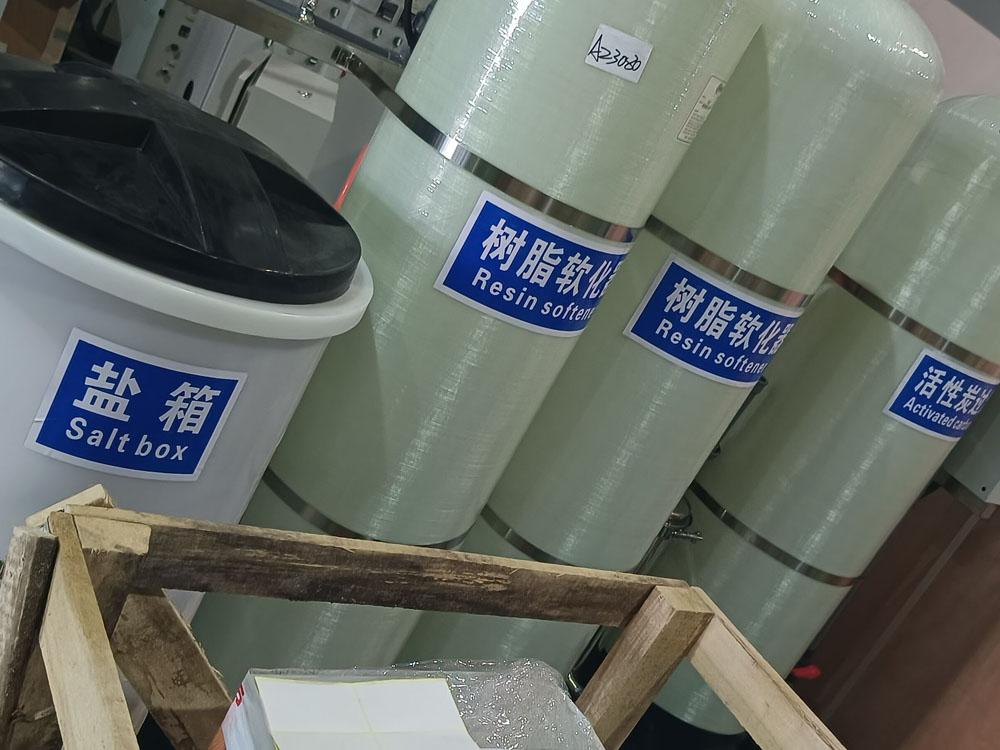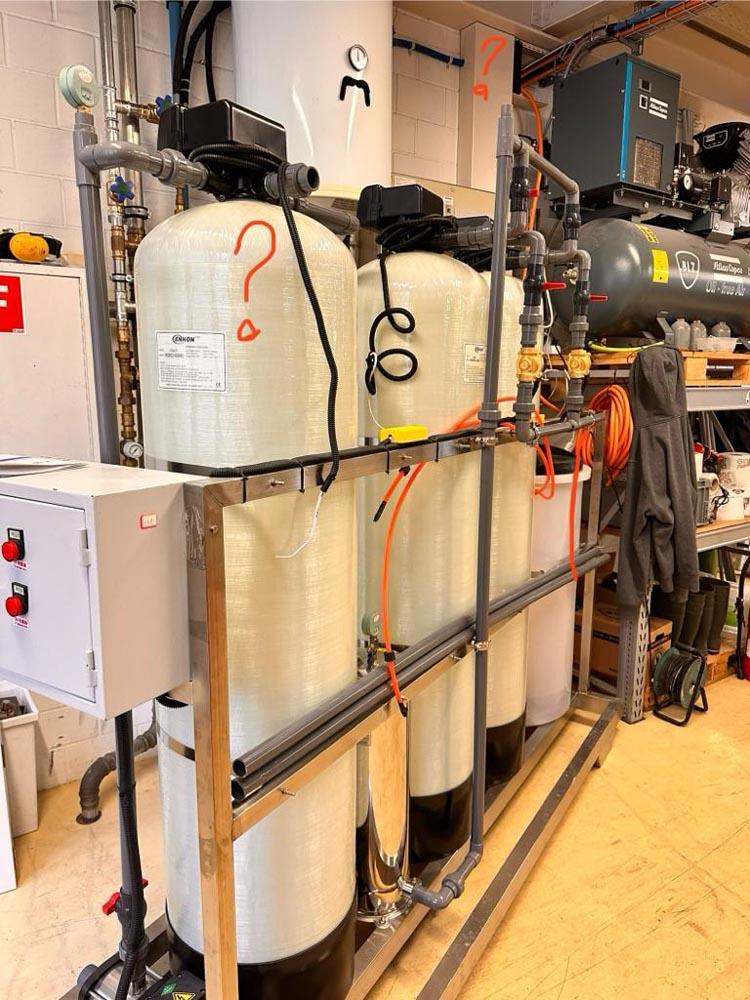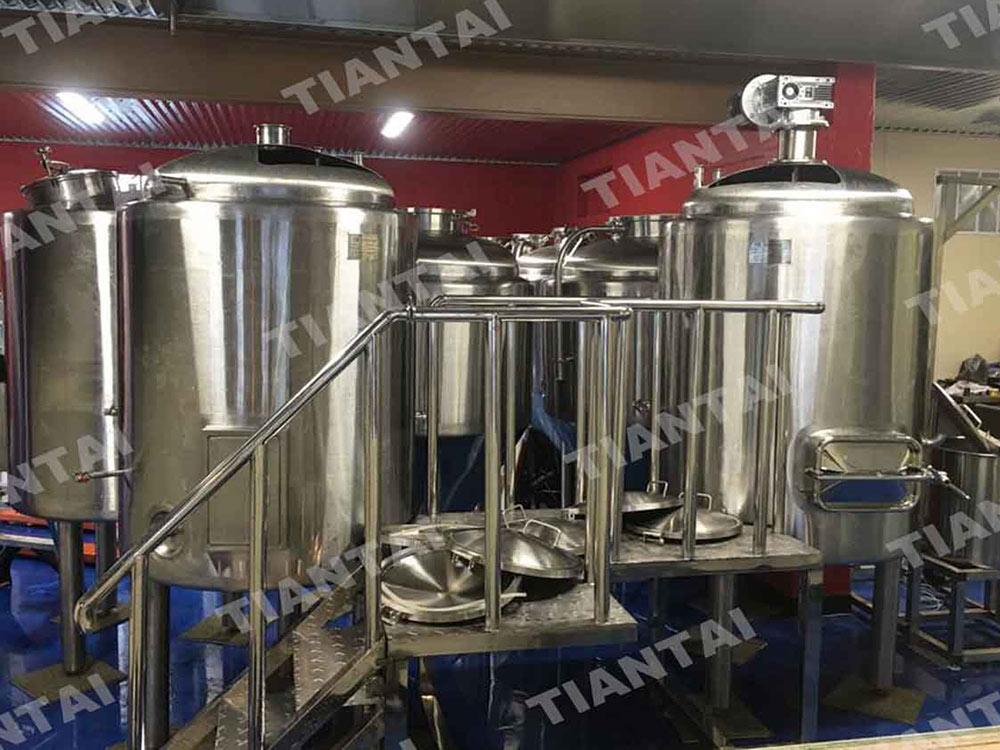Water Softening System in Brewery
- Apr 15, 2024
- 73
- tiantai
♦ Capacity: 500L/hr, 1000L/hr, 2000L/hr, 3000L/hr, 5000L/hr etc
♦ 1-2pcs Resin Softner
♦ 1pc Activated Carbon Filter
♦ 1pc Salt Box
♦ Fitting pipes and valve: UPVC
♦ 1pc Control panel
♦ 1pc Stainless Steel Frame
Introducing a water softening system into a brewery is crucial for ensuring the quality and consistency of the brewing process.
Hard Water Challenges: Many regions have hard water, containing high levels of dissolved minerals like calcium and magnesium. Hard water can lead to scaling in equipment, off-flavors in beer, and reduced efficiency in brewing processes.
Function of Water Softening System: A water softening system works by removing the minerals responsible for water hardness through a process called ion exchange. It exchanges calcium and magnesium ions with sodium ions, resulting in softened water with reduced mineral content.
Benefits for Brewing:
Improved Brewing Efficiency: Softened water ensures better extraction of flavors from malt and hops, leading to enhanced beer quality and consistency.
Equipment Protection: By preventing scale buildup in brewing equipment such as boilers, heat exchangers, and pipes, water softeners prolong their lifespan and maintain operational efficiency.
Consistency in Beer Flavor: Softened water helps maintain consistent water quality, which is essential for achieving the desired flavor profile in brewed beer.
Reduced Maintenance Costs: With fewer instances of scaling and corrosion, maintenance and cleaning costs for brewing equipment are reduced, resulting in overall cost savings for the brewery.
Integration into Brewery Operations:
Water softening systems can be installed at various points in the brewery's water supply line, depending on the specific requirements and layout of the facility.
Some breweries may opt for centralized water softening systems to treat water for the entire brewing process, while others may install localized softeners for specific equipment.
Considerations:
Water Quality Monitoring: Regular testing of water quality ensures that the softening system is functioning optimally and that water parameters remain within acceptable limits.
System Capacity: The size and capacity of the water softening system should be chosen based on the brewery's water usage and hardness levels.
In summary, integrating a water softening system into brewery operations is essential for maintaining water quality, prolonging equipment lifespan, and ensuring consistent beer quality, ultimately contributing to the success of the brewery.


♦ 1-2pcs Resin Softner
♦ 1pc Activated Carbon Filter
♦ 1pc Salt Box
♦ Fitting pipes and valve: UPVC
♦ 1pc Control panel
♦ 1pc Stainless Steel Frame
Introducing a water softening system into a brewery is crucial for ensuring the quality and consistency of the brewing process.
Hard Water Challenges: Many regions have hard water, containing high levels of dissolved minerals like calcium and magnesium. Hard water can lead to scaling in equipment, off-flavors in beer, and reduced efficiency in brewing processes.
Function of Water Softening System: A water softening system works by removing the minerals responsible for water hardness through a process called ion exchange. It exchanges calcium and magnesium ions with sodium ions, resulting in softened water with reduced mineral content.
Benefits for Brewing:
Improved Brewing Efficiency: Softened water ensures better extraction of flavors from malt and hops, leading to enhanced beer quality and consistency.
Equipment Protection: By preventing scale buildup in brewing equipment such as boilers, heat exchangers, and pipes, water softeners prolong their lifespan and maintain operational efficiency.
Consistency in Beer Flavor: Softened water helps maintain consistent water quality, which is essential for achieving the desired flavor profile in brewed beer.
Reduced Maintenance Costs: With fewer instances of scaling and corrosion, maintenance and cleaning costs for brewing equipment are reduced, resulting in overall cost savings for the brewery.
Integration into Brewery Operations:
Water softening systems can be installed at various points in the brewery's water supply line, depending on the specific requirements and layout of the facility.
Some breweries may opt for centralized water softening systems to treat water for the entire brewing process, while others may install localized softeners for specific equipment.
Considerations:
Water Quality Monitoring: Regular testing of water quality ensures that the softening system is functioning optimally and that water parameters remain within acceptable limits.
System Capacity: The size and capacity of the water softening system should be chosen based on the brewery's water usage and hardness levels.
In summary, integrating a water softening system into brewery operations is essential for maintaining water quality, prolonging equipment lifespan, and ensuring consistent beer quality, ultimately contributing to the success of the brewery.






.jpg)